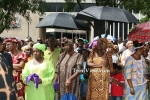By Raffique Shah
Sunday, August 3rd 2008
 AS many of my African brethren gathered over the past week to mark Emancipation Day, I reflected on just how emancipated we are. And I don’t mean just Afro-Trinis, I mean all of us who form the melting pot that is Trinidad and Tobago. I started this column by noting that many among the Afro-Diaspora would mark emancipation. Not all. Far from it, the majority of those who descended from the most barbaric form of slavery known to mankind are not even aware that their forebears were brought here (and elsewhere in the West) against their will, in shackles, in the most inhumane conditions.
AS many of my African brethren gathered over the past week to mark Emancipation Day, I reflected on just how emancipated we are. And I don’t mean just Afro-Trinis, I mean all of us who form the melting pot that is Trinidad and Tobago. I started this column by noting that many among the Afro-Diaspora would mark emancipation. Not all. Far from it, the majority of those who descended from the most barbaric form of slavery known to mankind are not even aware that their forebears were brought here (and elsewhere in the West) against their will, in shackles, in the most inhumane conditions.
Today (Emancipation Day), without sparing a thought for their ancestors, the wealthy would host parties or play golf. Others will have already left with their families to enjoy the “long weekend” abroad or at some of our local beach resorts. Yet others would crowd clubs whose owners want nothing to do with Africans-except take their money. And even among those who don their Afro-garb to celebrate, by tomorrow they will have discarded the symbols of their ancestry much the way masqueraders ditch their costumes on Carnival Tuesdays.
For them it’s all a charade, not a parade. The human dignity their ancestors fought for is lost in the thick fog of distorted history. And I stand in my shorts-and-slippers and wonder. Some years ago when the Emancipation Committee invited the Ooni of Ife as its special guest, I incurred the wrath of many among my brethren when I strongly objected to this symbol of inequality as being representative of Africans. The Ooni, they argued, was both a spiritual leader and a member of African royalty.
That he and others like him continue to treat ordinary Africans little different to the way White slave-masters did, was of little consequence to those who wanted to match Afro-royalty with Euro-royalty.
But did we not condemn the very concept of “royalty” back in 1970? Did we not agree that all men and women were born equal, that if you cut me, lowly plebe, and cut Queen Elizabeth, the British monarch, the same blood would flow? Hell, mine may even be of superior quality than hers. So if we rejected European royalty, why should we accept African or Indian or Tibetan or Nepalese royalty? The Nepalese, I need add, following recent elections that brought a new government to power, banished the King to an ordinary residence somewhere in Katmandu. And in a long, bitter battle that lasted for decades, the Indian Congress party under Nehru and his daughter Indira Gandhi, finally sent the Maharajahs packing.
It’s not that the lofty ideal of equality among human beings, wherever they exist, is easily achieved. In India, even as the caste system fades, a class system replaces it. In Africa, some liberators of yesteryear have morphed into monsters, oppressing their own people. In the Diaspora, among both Africans and Indians, colour-of-skin still counts. A whiter-shade-of-pale is superior to brown or black skins. In the Arab world, self-appointed Sheikhs, all of them agents of imperialism, wield inordinate power over their “subjects”. Here in the Caribbean, the ruling elite are Africans or Indians for a few days a year. Mostly, they remain comfortable in their colonial straitjackets and capitalist mindsets, accepting inequality among mankind as divine decree.
So what has changed in that near-500-year-span between slavery, emancipation, indentureship and independence? Not much, really. We exchanged slave-masters for governors, moved from prime ministers to presidents, and now we have added “community leaders”, criminals really, to the elite that wield gun-power over us all. I cannot help but feel a sense of guilt. It was my generation that tried hardest to remove the shackles that bound us physically and mentally. We sought, across the world, Blacks and Whites (and all shades in-between), to create idealistic, egalitarian societies. But we failed.
Except for token concessions granted us by the rulers of this imperfect and unfair world, we gained nothing. Oh, a few among us insist on maintaining our self-respect and self-esteem. We refuse to bow our now-aging heads to those who arrogate unto themselves god-like powers. We do not genuflect to wealth that the foolish equate with power. Many of us will go to our graves “bearing among ourselves the dignity of many men” as Jose Marti wrote many moons ago. Still, I cannot help but mourn our losses even as we celebrate the emancipation of slaves or the freedom of indentured labourers.
Bob Marley was prophetic when he called on his brethren to “emancipate yourself from mental slavery.” One of the more vocal lions of that generation that gave voice to the voiceless, Bob pleaded with his people to free themselves, not wait on others to free them. Almost 30 years after his death they still sing and dance to his haunting melodies. But do they heed his lyrics? I think not. Bob’s messages-in-song have given way to the nihilism of artistes like “50 Cents”, much the way Walter Rodney’s fight for dignity among all peoples died with the Burnham-bomb that killed him.
True emancipation, I fear, remains as elusive today as it was 500 years ago.
